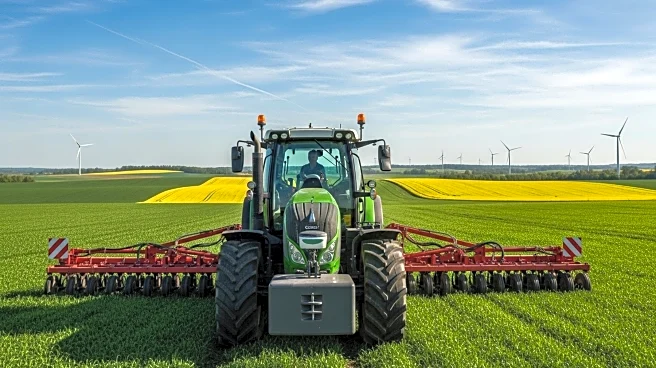What is the story about?
What's Happening?
Autosteer GPS systems are transforming agricultural practices by enhancing precision and efficiency in fieldwork. These systems utilize global navigation satellite systems (GNSS) such as GPS, GLONASS, and Galileo to automate the guidance and steering of farming machinery like tractors and sprayers. By achieving sub-inch accuracy with correction services like Real-Time Kinematic (RTK), these systems allow equipment to follow predefined paths with minimal human intervention. This technology reduces overlaps and skips during fieldwork, optimizing productivity and minimizing input waste. The adoption of autosteer systems is becoming increasingly accessible, not only for large industrial farms but also for smaller and mid-sized operations, thanks to reduced hardware costs and improved integration with farm management software.
Why It's Important?
The implementation of autosteer GPS systems is significant for the agricultural sector as it directly impacts productivity and sustainability. By minimizing input waste and optimizing field operations, these systems contribute to cost savings and increased yields. They also support sustainable farming practices by reducing chemical runoff and fuel consumption, thus lowering the environmental footprint of agricultural activities. The technology's ability to enhance precision in input application supports data-driven decision-making, which is crucial for modern farming. As more farms adopt this technology, the agricultural industry can expect improved efficiency, reduced operational costs, and a stronger alignment with environmental sustainability goals.
What's Next?
As the technology continues to evolve, the future of autosteer GPS systems in agriculture looks promising. The trend towards full vehicle autonomy is expected to grow, allowing machinery to operate with even less human supervision. Continued advancements in machine learning and AI sensors will further improve path planning and obstacle detection, enhancing the systems' adaptability to various field conditions. The integration of autosteer systems with farm management software will enable seamless data sharing and lifecycle management, from planting to harvest. As hardware costs decrease, these systems will become more accessible to all farmers, regardless of operation size, paving the way for widespread adoption and further advancements in precision agriculture.
Beyond the Headlines
The adoption of autosteer GPS systems also raises important considerations regarding data privacy and security, as these systems rely on cloud-based services and data analytics. Ensuring the protection of sensitive farm data will be crucial as the technology becomes more integrated into farm operations. Additionally, the shift towards automation may impact labor dynamics in the agricultural sector, potentially reducing the demand for manual labor while increasing the need for skilled workers to manage and maintain these advanced systems.

















